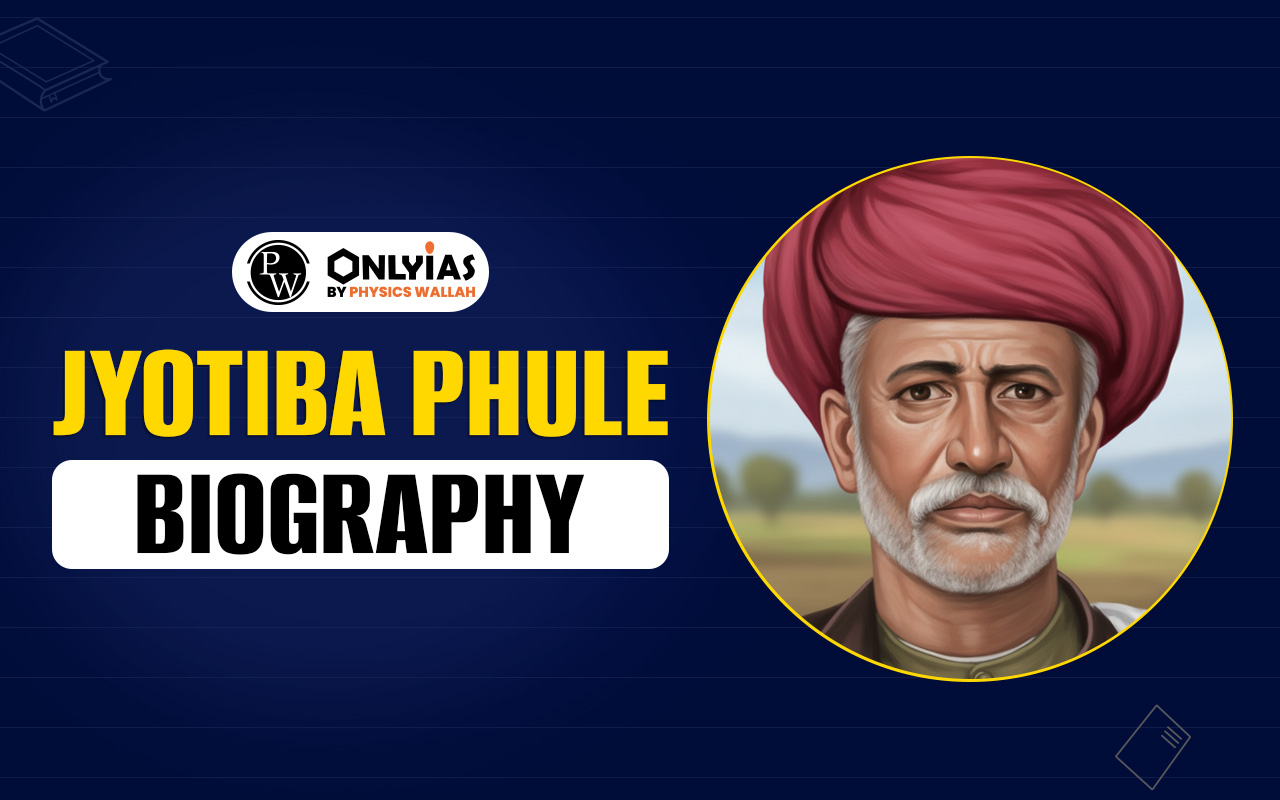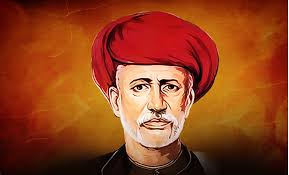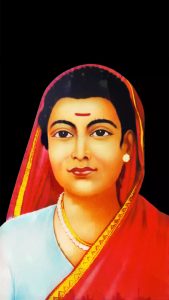Jyotiba Phule, born on April 11, 1827, in Maharashtra, was a visionary social reformer who challenged caste discrimination, promoted women’s education, founded Satyashodhak Samaj, and worked tirelessly for Dalit and social empowerment.

Jyotiba Phule was a visionary social reformer, thinker, and activist who played a crucial role in challenging caste discrimination and advocating for women’s education in 19th-century India. Born on April 11, 1827, in Maharashtra, he dedicated his life to uplifting marginalized communities and promoting social justice. Phule founded the Satyashodhak Samaj in 1873 to fight caste-based oppression and worked tirelessly for the empowerment of Dalits and women. His contributions laid the foundation for progressive social reform movements in India.
Jyotiba Phule’s Death Anniversary will be held on 28th November 2025. He was a renowned social reformer, thinker, and activist who dedicated his life to fighting caste discrimination, promoting education, and empowering women. Phule, along with his wife Savitribai Phule, pioneered efforts in establishing schools for girls and the underprivileged, leaving a lasting legacy in India’s social reform movement.
Mahatma Jyotiba Phule’s birth anniversary is celebrated every year on April 11th to honor his immense contributions to social reform and equality. Born on this day in 1827, Phule fought against caste discrimination and championed women’s education. On April 11, 2025, India will commemorate his 197th birth anniversary, remembering his legacy of justice, education, and empowerment for the marginalized.
Read More: Mahatma Jyotiba Phule Birth Anniversary 2025

Jyotiba Phule, born on April 11, 1827, in Maharashtra, India, was a social reformer, thinker, and philosopher who dedicated his life to challenging the oppressive social structure of 19th-century India. Phule’s efforts were instrumental in advocating for the rights of marginalized communities, particularly the Dalits (formerly known as untouchables) and women. This article explores the life and legacy of Jyotiba Phule, highlighting his significant contributions to social reform in India.
Jyotiba Phule, born on April 11, 1827, in present-day Maharashtra, India, was a prominent social reformer, thinker, and activist during the 19th century. He dedicated his life to challenging and eradicating the oppressive caste system and advocating for the rights of marginalized communities, particularly the Dalits and women. Phule established the Satyashodhak Samaj (Society of Seekers of Truth) in 1873, which aimed to uplift the oppressed and provide them with education and social empowerment. He strongly advocated for women’s education and played a pivotal role in opening the first school for girls in India in 1848. Phule’s progressive ideas and tireless efforts laid the foundation for social equality and justice in India.
Jyotiba Phule was born into a family belonging to the Mali caste, traditionally associated with agriculture. Despite belonging to a relatively higher caste, Phule was aware of the prevailing discrimination and caste-based inequalities from an early age. He received a limited education but was fortunate to attend Scottish missionary schools, where he learned English, which played a crucial role in his future endeavors.
Jyotiba Phule, also known as Mahatma Jyotirao Phule, was a prominent social reformer, thinker, and activist in 19th-century India. He played a crucial role in challenging social injustices such as caste discrimination and gender inequality prevalent during that time. While Jyotiba Phule’s family had a significant influence on his life and work, it is important to note that specific details about his family members may be limited due to the lack of comprehensive historical records.
Jyotiba Phule was born on April 11, 1827, in Pune, Maharashtra, India. He belonged to a lower-caste Mali family, which was engaged in agricultural activities. Jyotiba Phule’s father, Govindrao Phule, worked as a vegetable vendor, and his mother’s name was Chimnabai.
Jyotiba Phule married Savitribai Phule, who was a revolutionary figure herself and played a crucial role in his social reform activities. Savitribai Phule was India’s first female teacher and a strong advocate for women’s rights and education. She co-founded the first school for girls in Pune, breaking social norms and paving the way for women’s empowerment.

Together, Jyotiba and Savitribai Phule had a son named Yashwant Rao Phule, who was their only surviving child. Yashwant Rao Phule also contributed to social reforms and carried forward his parents’ legacy. However, information about Yashwant Rao Phule’s life and work is relatively limited compared to his parents.
Jyotiba Phule Founding of Satyashodhak Samaj
In 1873, Jyotiba Phule founded the Satyashodhak Samaj, meaning “Society of Seekers of Truth.” The organization aimed to challenge the oppressive caste system and improve the social conditions of marginalized communities. Satyashodhak Samaj rejected the authority of the Brahmins, promoted education for all, and advocated for social and economic equality.
The famous social reformer Jyotiba Phule founded the Satyashodhak Samaj in the Maharashtra region of Pune in 1873. Phule’s main goal was to improve the lot of Maharashtra’s lower sections and stop the British rule and the oppressive moneylender system from taking advantage of them economically and socially. The administration’s high tax demands, their disrespect for natural disasters that resulted in crop failure, and the sharp swings in food grain prices in the market were the inspirations for the peasant protests in Maharashtra, particularly in Pune. All of these had played a part in their poverty and crushing debt load.
Mukundrao Patil, a well-known Samaj spokesman, used his newspaper Din Mitra and other publications to bring the British government’s and the public’s attention to the economic and social exploitation of the peasants. Additionally, the Samaj used traveling tamasha (regional traditional play) groups to popularize the cause of peasants. When the Samaj organized conferences on their problems, a large number of peasants attended. A boycott of agriculture resulted from the developing dissatisfaction of the tenants toward their landlords, which resulted in an uprising that occurred from 1919 to 21.
In Satara, where the Samaj established branches in several villages, the movement gathered significant support. A key component of the national movement against British imperialism was the peasant struggle against feudalism and landlordism, as the colonial government was ultimately in charge of maintaining the exploitative and strict economic and social system.
Phule was a staunch advocate for women’s rights and tirelessly worked to combat the prevailing patriarchy. He initiated the practice of educating girls and opened the first school for girls in Pune in 1848. Phule believed that women’s education was essential to uplift society as a whole and fought against child marriage and other oppressive practices that deprived women of their rights.
One of Phule’s most significant contributions was his critique of Brahmanical hegemony and the oppressive caste system. He challenged the Brahmins’ claim to superiority by advocating for the rights and dignity of Dalits and other marginalized castes. Phule argued that the caste system perpetuated social and economic inequality and called for its abolition.
Jyotiba Phule actively campaigned against various regressive social practices prevalent during his time. He fought against untouchability, worked to eradicate the practice of sati (the immolation of widows), and advocated for widow remarriage. Phule also emphasized the need to provide equal opportunities for education and employment to all individuals, irrespective of their caste or gender.
Phule’s writings played a significant role in spreading awareness and inspiring social change. He authored several influential works, including “Gulamgiri” (Slavery), which critiqued the oppression faced by Dalits, and “Shetkaryacha Asud” (Cultivator’s Whip), which highlighted the plight of farmers and their exploitation by upper-caste landlords.
Jyotiba Phule, also known as Jyotirao Phule, was a social reformer, thinker, and activist from Maharashtra, India. He played a crucial role in advocating for the rights of marginalized communities, particularly Dalits and women, during the 19th century. Although Jyotiba Phule primarily wrote in Marathi, some of his works have been translated into English and other languages. Here are a few notable books written by Jyotiba Phule:
Jyotirao Phule, also known as Jyotiba Phule, was a social reformer, philosopher, and writer from Maharashtra, India. He was born on April 11, 1827, in Pune, and he passed away on November 28, 1890, in the same city.
Jyotiba Phule was a prominent figure in the social reform movement in the 19th century. He actively worked to abolish social discrimination and fought against caste-based oppression. Phule was a strong advocate for women’s rights and education. He and his wife, Savitribai Phule, played a crucial role in opening the first school for girls in Pune.
Phule’s contributions to society were significant, and his ideas continue to influence modern India. He challenged the traditional caste system and called for social equality and justice. His work laid the foundation for the social reform movements that followed in India.
Jyotiba Phule’s death on November 28, 1890, marked the end of a remarkable life dedicated to social reform and the upliftment of marginalized communities in India. His legacy remains an inspiration for those who continue to fight against social inequality and injustice.
Jyotiba Phule’s tireless efforts laid the foundation for the social reform movement in India. His teachings and philosophy continue to inspire generations of activists fighting for social justice and equality. Phule’s work provided the impetus for subsequent social reform movements, such as the Dalit movement and the women’s rights movement, which have significantly contributed to shaping modern India.
Ready to boost your UPSC 2026 preparation? Join PW’s UPSC online courses today!
Jyotiba Phule founded the Satyashodhak Samaj, which was a social reform movement in Maharashtra, India. The movement aimed to fight against caste-based discrimination and promote education and equality for all.
Jyotiba Phule’s Death Anniversary will be observed on 28th November 2025.
Jyotirao Phule is known for his social reform efforts and his contributions to the upliftment of marginalized communities, particularly the lower castes and women. He worked towards the eradication of social evils such as caste discrimination, untouchability, and gender inequality. Phule advocated for education for all and played a significant role in establishing schools for girls and lower castes. He also wrote extensively on social issues and published several influential books and pamphlets.
The first teacher in India is often attributed to be Siddhartha Gautama, also known as Gautama Buddha. Buddha was a spiritual leader and teacher who founded Buddhism and imparted his teachings to his disciples and followers. His teachings focused on the Four Noble Truths and the Eightfold Path, which form the core principles of Buddhism.
The first school in India is believed to be the ancient Nalanda University, which was established during the Gupta dynasty in the 5th century CE. Nalanda University was a renowned center of learning and attracted scholars from various parts of the world. It offered education in various fields, including philosophy, astronomy, mathematics, medicine, and literature. The university flourished for several centuries before it declined and eventually got destroyed in the 12th century.
He is remembered for his revolutionary work in promoting education for women and the lower castes, and for establishing the first school for girls in India with his wife, Savitribai Phule.
<div class="new-fform">
</div>